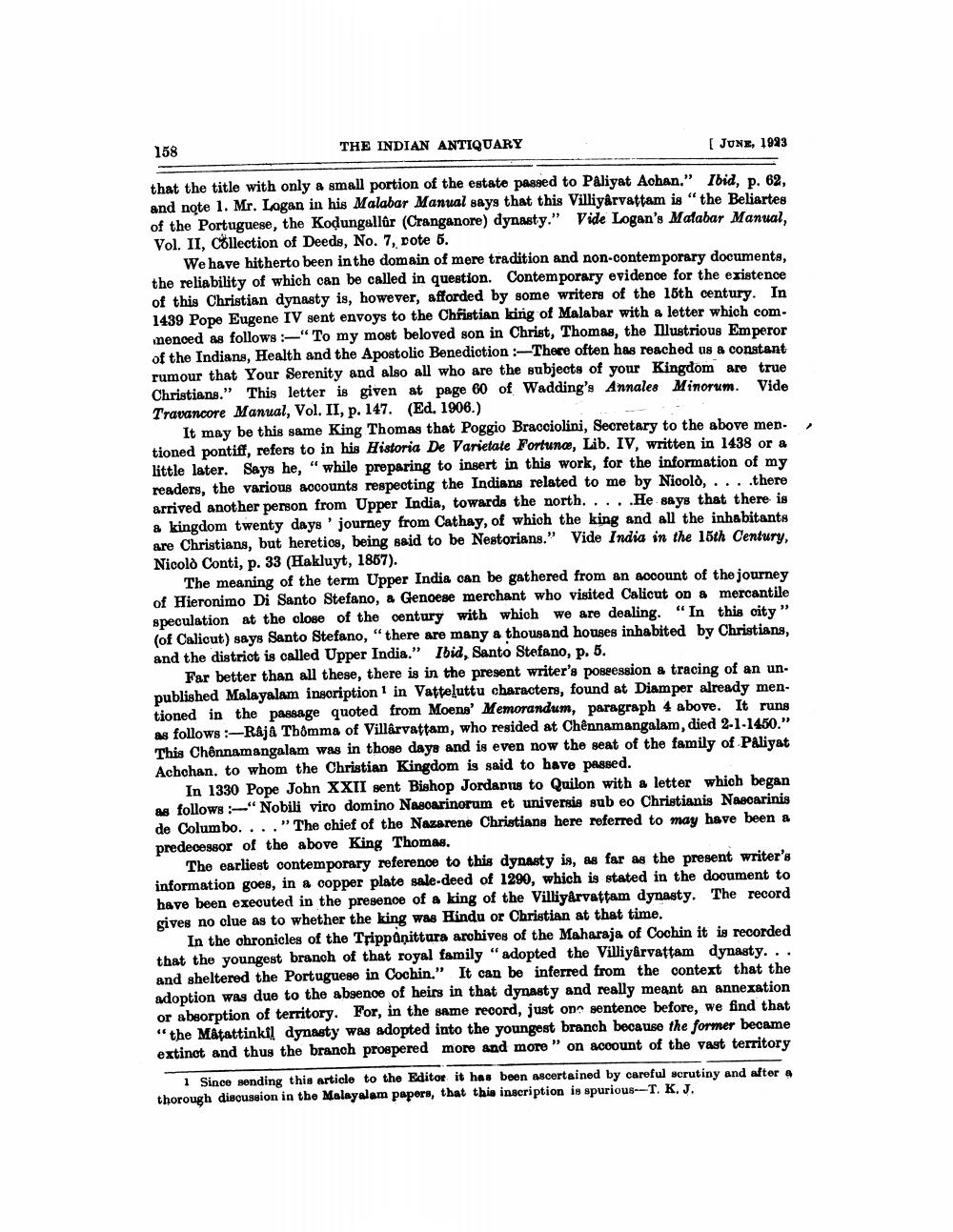________________
158
THE INDIAN ANTIQUARY
[ JUNE, 1993
,
that the title with only a small portion of the estate passed to Paliyat Achan." Ibid, p. 62, and note 1. Mr. Logan in his Malabar Manual says that this Villiyârvattam is "the Beliartes of the Portuguese, the Kodungallôr (Cranganore) dynasty." Vide Logan's Malabar Manual, Vol. II, Collection of Deeds, No. 7, pote 5.
We have hitherto been in the domain of mere tradition and non-contemporary documents, the reliability of which can be called in question. Contemporary evidence for the existence of this Christian dynasty is, however, afforded by some writers of the 16th century. In
1439 Pope Eugene IV sent envoys to the Christian king of Malabar with a letter which commenced as follows "To my most beloved son in Christ, Thomas, the Ilustrious Emperor of the Indians, Health and the Apostolic Benediction :-There often has reached us a constant rumour that Your Serenity and also all who are the subjects of your Kingdom are true Christians. This letter is given at page 60 of Wadding's Annales Minorum. Vide Travancore Manual, Vol. II, p. 147. (Ed. 1906.)
It may be this same King Thomas that Poggio Bracciolini, Secretary to the above men. tioned pontiff, refers to in his Historia De Varietate Fortunae, Lib. IV, written in 1438 or a little later. Says he, “while preparing to insert in this work, for the information of my readers, the various accounts respecting the Indians related to me by Nicolò, ....there arrived another person from Upper India, towards the north. . . . .He says that there is & kingdom twenty days' journey from Cathay, of which the king and all the inhabitants are Christians, but heretios, being said to be Nestorians." Vide India in the 15th Century, Nicold Conti, p. 33 (Hakluyt, 1867).
The meaning of the term Upper India can be gathered from an account of the journey of Hieronimo Di Santo Stefano, a Genoese merchant who visited Calicut on a mercantile speculation at the close of the century with which we are dealing. "In this city" (of Calicut) says Santo Stefano, "there are many a thousand houses inhabited by Christians, and the district is called Upper India." Ibid, Santo Stefano, p. 5.
Far better than all these, there is in the present writer's poseession a tracing of an unpublished Malayalam inscription in Vatteluttu characters, found at Diamper already men. tioned in the passage quoted from Moens' Memorandum, paragraph 4 above. It runs as follows:-Raja Thômma of Villárvattam, who resided at Chennamangalam, died 2-1-1450." This Chênnamangalam was in those daye and is even now the seat of the family of PAliyat Achohan, to whom the Christian Kingdom is said to have passed.
In 1330 Pope John XXII sent Bishop Jordans to Quilon with a letter which began as follows "Nobili viro domino Nascarinorum et universis sub eo Christianis Nascarinis de Columbo.... "The chief of the Nazarene Christians here referred to may have been a predecessor of the above King Thomas.
The earliest contemporary reference to this dynasty is, as far as the present writer's information goes, in a copper plate sale deed of 1290, which is stated in the dooument to have been executed in the presence of a king of the Villiy&rvattam dynasty. The record gives no clue as to whether the king was Hindu or Christian at that time.
In the chronicles of the Trippänittura archives of the Maharaja of Cochin it is recorded that the youngest branch of that royal family "adopted the Villiyârvattam dynasty... and sheltered the Portuguese in Cochin." It can be inferred from the context that the adoption was due to the absence of heirs in that dynasty and really meant an annexation or absorption of territory. For, in the same record, just on sentence before, we find that "the Måtattinkil dynasty was adopted into the youngest branch because the former became extinct and thus the branch prospered more and more " on account of the vast territory
Since sending this article to the Editor it has been ascertained by careful scrutiny and after a thorough discussion in the Malayalam papers, that this inscription is spurious--T. K.J.




